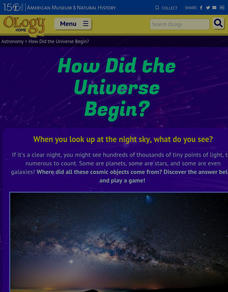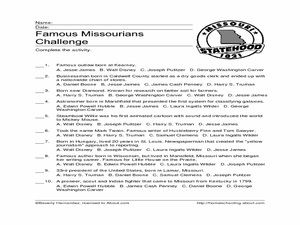NASA
Stellar Fingerprints and Doppler Red Shifts
Young scientists observe the spectra of elements and compare that to the Doppler effect. Hook scholars from the beginning all the way to the extension activities in this 5E-format lesson.
NASA
Down to Earth
There are only 10 types of people in the world: those who understand binary and those who don't. The lesson includes four activities in which students learn binary, convert binary to images, understand CCD arrays, and interpret...
Curated OER
Reading Comprehension 6
Set the timer for five minutes (or less), and distribute this resource to your class. There's a very short reading passage followed by a set of three questions. What a great tool in prepping your class for upcoming state testing.
American Museum of Natural History
How Did the Universe Begin?
The Big Bang Theory is more than a television show. Pupils read how Edwin Hubble observed other galaxies and noticed that the galaxies are moving away from each other. Scholars learn about the idea of the big bang and what happened next...
Education World
Every Day Edit - Neptune's Discovery
In this everyday editing instructional activity, students correct grammatical mistakes in a short paragraph about the discovery of Neptune. The errors range from grammar, spelling, capitalization, punctuation.
Education World
Every Day Edit - Pluto, the Dwarf Planet
In this everyday editing activity, students correct grammatical mistakes in a short paragraph about the planet Pluto. The errors range from punctuation, capitalization, spelling, and grammar.
Curated OER
Imagining China through Words
When Europeans first came back with tales of China, they provided vivid written accounts and minimal visual imput. This resulted in art rendered mostly from descriptive language. Learners explore this phenomena by listening to...
Curated OER
How To Build a Planet From The Inside Out!
High schoolers read about the Spitzer Space Telescope and the technology used to learn about planet composition. They calculate the radius of a planet, the size of a planet, the average density of a planet and the likely core composition...
New Mexico State University
Lab 6: Kepler's Laws
A 15-page package thoroughly teaches your physics or astronomy learners about Kepler's three laws of planetary motion. Each one is stated and explained. Class members answer questions, solve problems, and participate in the classic...
NASA
Discovering Some of Your “Yardsticks” Are Actually “Meter-sticks”
The Milky Way gets great reviews on Trip Advisor — 100 million stars. The activity allows scholars to rethink their assumptions and prior knowledge. Pupils observe a set of two lights at equal distance and brightness, but they believe...
NASA
Collecting Electromagnetic Radiation
Astronomy is literally over your head, but this lesson will explain how we study it. Young scientists make telescopes, calculate and compare the light gathering power of lenses, and simulate detection of infared radiation....
University of Texas
Multi-wavelength Astronomy
Explore a land far, far away with a well-designed lesson that examines electromagnetic imaging as a way to obtain information about galactic structures. Learners begin to see the importance of looking beyond the visual spectrum to...
University of Texas
Lives of Stars
Stars exist from a few million years to over 10 billion years, depending on their mass. Scholars perform a play acting as stars to learn about their different life cycles. They develop an understanding of many of the fundamental concepts...
American Museum of Natural History
What Do You Know About Astronomy
Develop an understanding of the universe. Learners answer 10 multiple choice questions about several topics in astronomy. Questions contain information about the age of the universe, gravitational attraction, galaxies, planets and comets...
Curated OER
Canada's Role in Astronomy and Space Science
Ninth graders, in groups, research a Canadian astronaut, developing a profile of their astronaut for presentation in a learning center. They visit the other groups' centers to explore more astronauts.
Curated OER
SIZING UP SOL
Ninth graders produce a projected, pinhole image of the sun and from measurement of the image and projection distance, calculate the actual size of the sun. They estimate the sun's apparent brightness from different planet.
Curated OER
Exploring Mars
Young scholars, working in small groups construct scale models of the planets and solar system. They examine images of Mars and discuss what might have caused the features. They record facts about their planetary research in their...
Curated OER
WebQuest Solar System Colonization Project 2000
Sixth graders investigate the livability of different planets in the universe by researching and organizing information from a number of sources in this unit project. They decide on a location for a space station which they support in an...
Curated OER
Proper Nouns
Use this worksheet to help your class identify proper nouns. They circle the proper nouns in 16 sentences. Answer key is provided.
Curated OER
Scientific Notation
Review conversion of decimal numbers into SN form with these examples of common astronomical applications and quantities. Young learners rewrite those numbers with scientific notation and with the correct units. The answers are available...
Curated OER
Famous Missourians Challenge
In this multiple choice worksheet, learners read descriptive sentences and choose the names of the persons being described. Students answer 10 multiple choice questions.
Curated OER
Technology for Studying Comets
Students design an Aerogel model to capture clay particles. In this space science lesson, students discover what happens to comets as they hit a surface. They explain how the Aerogel technology would help scientists study comets better.
Curated OER
2011 Nobel Prize Winners Announced
This assignment has young scientists read four different news articles about the 2011 Nobel Prize winners. Six questions are posed for children to write the answers. It is a relevant activity for getting middle schoolers to meet the...
Curated OER
HS 204: Introduction to Literature: Poetry Section
This outline introduction for a college course covers the idea of humanities and various language forms and literature genres. Beginning with the human species and our influence on the world around us, take a very thorough look at the...
Other popular searches
- Famous Astronomers
- Early Astronomers
- Major Astronomers
- Ancient Astronomers
- Greek Astronomers
- Report on Astronomers
- Astronomers Measure Distance
- Women Astronomers
- Female Astronomers
- Fumes Astronomers
- Five Early Astronomers
- Famous Astronomers Quizes

























